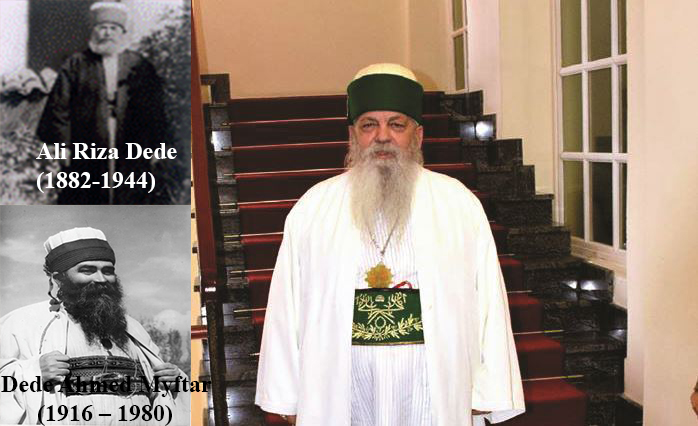
World Leader, Haxhi Dede Edmond Brahimaj: Appreciation and gratitude for the contribution of this Bektashi cleric!
Today marks the 76th anniversary of the passing from this life of the former Bektashi World Leader, Dede Ali Rizai
By Nuri Çuni
Today marks the 76th anniversary of the passing of this life of the famous cleric, the former Bektashi World Leader, Ali Riza Dede. For this event, starting from 10:00, until 17:00, at the Headquarters of the World Headquarters in Tirana, are made visits. Ali Riza Dede has an important contribution as a clergyman and patriot. "Ali Riza Dede, belongs to those devoted clerics of our Bektashi faith, who dedicated his whole life to the faith and the believers. He left his mark not only in the tekkes where he worked, in Kruja, Martanesh, Elbasan for 23 years, etc., but also in the period when he was elected Bektashi World Leader. Commemorating the 76th anniversary of his separation from this life, we appreciate the contribution he has made to Bektashism in one of the most difficult times "- affirms the Bektashi World Leader, His Grace Haxhi Dede Edmond Brahimaj.
Bektashi education
The former Bektashi World Leader, Ali Riza Dede, was born in the city of Kruja on October 18, 1876, from a family with a Bektashi tradition, in the apartments inside the Kruja castle. From an early age, his parents often took him to the tekke of Dolma, Shememi Baba and other tekkes in his hometown. Educated with this wonderful Bektashi faith, he saw the light and love of God, where special impressions left the frequent visits to the tekke of Sari Salltik on the mountain of Kruja, which made him walk every week with his parents. This was a tradition respected by all the believers of Kruja who went to the Holy Cave. After the death of his father, Hasan, the burden fell on him to support his family, because Rizai was the eldest of the children. At the age of 14 he worked as a worker in Kruja, Shijak in various jobs. At the age of 18 he went to the tekke of Shememi Baba in Fushë-Krujë and got his hands on the father of the tekke, became a spiritual member, myhib, and over time, gaining knowledge and following the rules and norms of the Bektashi order, was added much love to become a clergyman. With the permission of his family and relatives, he is consecrated a dervish by father Haxhi Subashi of the tekke of Shememi Babai.
Further formation as a clergyman
Ali Riza Dede, wanted to increase his knowledge of Bektashism and constantly sought to continue school abroad, in Haxhi Bektash. For this, he had the opportunity, around 1902, to go together with the dervish Xhaferi (he also became the Grandfather, in 1944) from Gjirokastra, to Haxhi Bektash in Turkey. Here for several years, dervish Rizai went to school and acquired the necessary knowledge of the Bektashi way. But during this period, he made the obligatory journey to Mecca, visited the tomb of the Prophet Muhammad, of Imam Ali in Najaf, and the tombs of the martyrs of Karbala. He also made many visits to Iraq and other Eastern countries. For several years he attended theological school in the city of Damascus, Syria, further increasing his theological religious knowledge and teaching of medicine. Around 1914 he returned to Albania, to his hometown, Kruja. But the difficult situation and the blind religious war were, made dervishes Rizai, together with dervishes Asllan Trepshi to go serve in the tekke of Martanesh for several years. They left very good traces in the population of this province with traditions in faith and love in God. In particular, the esteemed father Ali communicated with the believers and often went to the holy place in Ballenjë of Martanesh, to the cave of Ballëm Sullani with a great history. Here, in the Captain of Martanesh, there was a pilgrimage from the whole area and from Dibra.
In 1918 he was called by father Hamidi of the tekke "That wash itself" in Elbasan, where he completed the experience under his special care. After the death of Hamid's father, he took up his post according to Bektashi rules. Here he worked diligently for 23 years, until 1941. From year to year his authority increased and he gained a special respect, not only for the Bektashi believers, but also for all the inhabitants of Elbasan and the surrounding provinces. With many years of work and religious preaching he had acquired skills, mystical gifts which he put in the service of the believers and benefactors of the province of Elbasan, he became a well-known personality of Bektashism. He prepared many myhibs, dervishes, he also helped dervishes Ahmet Myftar Ahmataj for the culture and religious rites of the Bektashi faith, he saw in him, love, devotion to the family of Ahl al-Bayt, who was a dervish in his time. He turned the tekke into a beautiful place with a garden, plants and flowers, which was visited by all the citizens of Elbasan, He turned the tekke into a beautiful place with a garden, plants and flowers, which was visited by all the citizens of Elbasan, which turned into a hearth of education and shelter for the poor, which radiated kindness, love and brotherhood for all.
Bektashi World Leader
After the death of the late Supreme Leader, Sali Niazi Dede, on November 28, 1941, in Tirana, the clerical council elected Father Riza, World Bektashi Supreme Leader, on January 10, 1942. As the Supreme Leader, he first completed the large building he erected. Sali Niazi Dede and organized work inside and outside the country in strengthening Bektashism. During this period he communicated, cooperated, made connections with several tekkes in the Balkans and beyond. Archival documents speak of cooperation with the Bektashi community in the region and in the world. Of course, in the years 1942-1944, due to the violent currents of the Second World War, like any other faith in Albania, Bektashism would be faced with great dilemmas. Because the tekkes were full of myhibs and benefactors, who kept their eyes on their myrshids. There were Bektashi tekkes like the one in Rabija in Tepelena that were turned into Karbala by the blood of clerics and myhibs, in the war with the Italian fascist occupier, but there were also tekkes like the one in Zall in Gjirokastra, which did not open its doors to communism, knowing that his ideas came from distant Russia, which had never loved us. So realistically, the Bektashi dervishes and fathers in most cases, were guided not by ideologies but by the sacred motto to defend the freedom and independence of the homeland. It was in these moments of such great historical responsibility that Dede Ali Rizai proved courageous and far-sighted. With words and deeds, he called on every Bektashi believer to be the god of the nation’s destinies, because even our own Piri, Hajji Bektash Veliu, considered it an obligation for the homeland to be protected by foreigners with rifles. Although there were interventions from the state instances of the time to join the government in the decisions taken, Dede Ali Rizai preserved the Bektashi tradition sacred and walked in the bright footsteps of Sali Niazi Dedei. He passed away on February 22, 1944 in the hospital of Tirana, but his death remained a mystery to this day. With the fall of communism in Albania, his remains were brought in June 1993 from the public cemetery in Tirana and today they are buried in the tombs of dedelers in the Bektashi World Headquarters. He was decorated with the high title by the President of the Republic in 1993, with the Order for patriotic activities of Class I. Also in 2017 he was decorated by the President of the Republic with the high title "Honor of the Nation". His commemoration of the 76th anniversary of his death, his activity and contribution is a valuable message he gave about Bektashism in Albania and in the world. He was and remained tireless in the way of Hak. His voice, his spirit, his whole life, comes today to generations of Bektashi clerics and believers as a waterfall of eternal merchandise. His sacrifices remain evidence for generations.
Prepared for publication: K. Borici
Notice
Today, on the occasion of the 76th anniversary of the passing away of the former Bektashi World Leader Ali Riza Dede and the 104th anniversary of the birth of Dede Ahmet Myftari, February 22, 2020, from 10:00 to 17:00, visit to the Headquarters of the World Headquarters in Tirana.
Bektashi World Grandfather
His Grace,
Haxhi Dede Edmond Brahimaj
